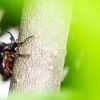
AsianScientist (Oct. 15, 2025) – Arthropods such as insects and spiders play a critical role in ecosystems. Though small in size, they carry out crucial ecosystem functions like decomposition and pollination, while serving as a food source for larger animals.
However, global arthropod populations may be under threat. Studies have found evidence of arthropod biodiversity declining in temperate regions, though tropical regions remain understudied.
In a recent study published in Nature, an international team of researchers have discovered the trend extends to the tropics as well.
Led by ecologists from the School of Biological Sciences (SBS) from Hong Kong University (HKU), the researchers conducted a time-series analysis, drawing on data from previous studies in tropical rainforests across the Americas and Southeast Asia. The team combined data from nine tropical rainforest sites untouched by commercial human activity to model the changes in arthropod diversity over time.
Even in these undisturbed rainforest sites, the team discovered significant, long-term species losses in several groups of arthropods, including spiders, butterflies, and beetles.
“To find such large declines across so many different studies is really bad news,” said Adam Sharp, Postdoctoral Fellow at HKU SBS, lead author and data analyst. “Our results strongly suggest that the immense biodiversity of tropical rainforest arthropods is under immediate threat.”
“Since all of the data we used comes from rainforests considered ‘untouched’, it means even the deepest and darkest tropical rainforests are likely to be heavily impacted.”
The researchers linked this decline to the El Niño–Southern Oscillation (ENSO), an atmospheric phenomenon that affects global weather patterns.
“We believe the increasing frequency of El Niño is driving these widespread arthropod declines,” said corresponding author Michael Boyle, Research Fellow at HKU SBS. “In these tropical rainforests that haven’t otherwise been physically modified by humans, we can rule out habitat loss, pesticides, pollution and various other threats. In these places, El Niño seems to be the prime suspect.”
Arthropod populations are sensitive to ENSO, with the opposing El Niño and La Niña stages each favouring different arthropod types. These effects normally balance out over time, but with climate change driving more frequent and intense El Niño events, arthropod populations are at risk, particularly those species that thrive in La Niña conditions.
“Arthropods are essential components of functioning ecosystems, carrying out vital processes,” said HKU Associate Professor Louise Ashton, corresponding author of the study.
“We found declines in certain arthropod groups were linked to lower rates of two essential ecological processes: decomposition and herbivory, indicating that biodiversity loss is reshaping how entire ecosystems work. In light of these results, it is essential that we act now to limit the severity of global climate change and prevent further biodiversity loss,” said Ashton.
The team is continuing their research across rainforest sites in Hong Kong, Mainland China, Australia and Malaysia to gain more insights into the changing arthropod population. They emphasise the importance of continuing to monitor rainforest biodiversity to better understand the impacts of climate change.
—
Source: Hong Kong University; Image: Shutterstock
This article can be found at: Stronger El Niños reduce tropical forest arthropod diversity and function
Disclaimer: This article does not necessarily reflect the views of AsianScientist or its staff.

